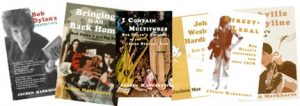Mississippi, Desolation Row, Crossing The Rubicon, Where Are You Tonight, Tombstone Blues… Some songs are so rich and multicoloured that they deserve their own book . I fear that almost every song on Rough And Rowdy Ways is going to claim that right. The book of this series is now available.
——————-
by Jochen Markhorst
XV The aim of all life is death
Greedy old wolf - I’ll show you my heart
But not all of it - only the hateful part
I’ll sell you down the river - I’ll put a price on your head
What more can I tell ya -
...I sleep with life and death in the same bed
 “I sleep with life and death in the same bed. I suppose we all feel that way when we hit a certain age. Do you think about mortality often?” asks Douglas Brinkley in the New York Times interview, June 2020. In which he relegates himself to yet another analyst who equates the “I” in a work of art with the author. It’s 2020, so Dylan has been confronted for literally more than half a century by fans, journalists and even scholars who stubbornly insist on the superficial, sensation-seeking belief that the songs were written by Dylan and that they must then therefore be about himself, his life, his loves, his beliefs and all the other intimately-personal stuff.
“I sleep with life and death in the same bed. I suppose we all feel that way when we hit a certain age. Do you think about mortality often?” asks Douglas Brinkley in the New York Times interview, June 2020. In which he relegates himself to yet another analyst who equates the “I” in a work of art with the author. It’s 2020, so Dylan has been confronted for literally more than half a century by fans, journalists and even scholars who stubbornly insist on the superficial, sensation-seeking belief that the songs were written by Dylan and that they must then therefore be about himself, his life, his loves, his beliefs and all the other intimately-personal stuff.
Inevitably on unfiltered media like expectingrain‘s fan forums, where heated conspiracy thinkers are given ample scope to – for example – “prove” that Dylan in 2020 is still trying to come to terms with his stranded marriage of nearly fifty years ago to Sara Dylan (to name just one of the more desperate theories), but interviewers from more serious media have for over fifty years proved just as susceptible to the naive, facile approach.
It’s hardly a consolation for Dylan, but still: it is of all times. When Goethe, in his autobiography Dichtung und Wahrheit (From my Life: Poetry and Truth; 1811–1833), looks back on the work that brought him world fame and fortune and immortality, on Die Leiden des jungen Werther (The Sorrows Of Young Werther, 1774), Dylan will nod in recognition at:
“Being prepared for all that might be alleged against Werther, I found those attacks, numerous as they were, by no means annoying; but I had no anticipation of the intolerable torment provided for me by sympathizers and well-wishers. These, instead of saying anything civil to me about my book just as it was, wished to know, one and all, what was really true in it; at which I grew very angry, and often expressed myself with great discourtesy.
“To answer this question, I should have been obliged to pull to pieces and destroy the form of a work on which I had so long pondered, with the view of giving a poetical unity to its many elements; and in this operation, if the essential parts were not destroyed, they would, at least, have been scattered and dispersed.”
(Dichtung und Wahrheit, part 3, thirteenth book)
Goethe complains about the intolerable torment (“eine unleidliche Qual”) of remorseless fans who only want to know what is really true, which makes him very angry (“sehr ärgerlich”). He writes this around 1812, but is certainly not new to it; as early as 1788, in one of his Italian letters, he has exactly the same complaint: “Hier sekkieren sie mich mit den Übersetzungen meines „Werthers“und fragen, ob auch alles wahr sei! Das ist nun ein Unheil, was mich bis nach Indien verfolgen würde (Here they pester me with the translations of my “Werther” and ask whether everything is true! This is a misery that would follow me all the way to India).”
But not only the tired irritation will evoke recognition from Dylan. Noteworthy is Goethe’s explanation of his distaste: to answer the question of what is true, he would “zerrupfen und die Form zerstören müssen, have been obliged to pull to pieces and destroy the form”, thus pulverising its “poetische Einheit, poetic unity”. In slightly different words, this is the same argument with which Dylan opposes Brinkley’s attempts at interpretation in this same interview:
“You’re taking Anne’s name out of context, she’s part of a trilogy. […] It’s the combination of them that adds up to something more than their singular parts. To go too much into detail is irrelevant. The song is like a painting, you can’t see it all at once if you’re standing too close. The individual pieces are just part of a whole.”
… after Dylan has also already resisted biographical interpretation, less vexed or weary than Goethe; “I think about it [death] in general terms, not in a personal way.”
Brinkley’s fascination with this particular verse, however, is of course perfectly understandable. I sleep with life and death in the same bed has a nineteenth-century grandeur; the form has a Baudelaire-like couleur, the content is – obviously – twenty-four-carat Freud. With a bit of goodwill, one might even appreciate Dylan’s verse as an extremely concentrated, all-encompassing summary of Freud’s life’s work; after all, Freud is already sixty-four years old when he comes to the conclusion that all our urges and passions are ultimately reducible to Eros and Thanatos, to life drive and death drive. Freud tries to prove this in his essay Jenseits des Lustprinzips (Beyond The Pleasure Principle, 1920), the essay with the much-quoted Das Ziel alles Lebens ist der Tod (“the aim of all life is death”), and in which he argues at length that the Todestrieb (death drive) and the Lebenstrieb (life drive, usually called libido by Freud) are not mutually exclusive, but on the contrary, precisely because they coexist in us, they define our behaviour. Or, as Dylan would say, we sleep with Eros and Thanatos in the same bed.
Which will all, to complete the circle, again be inspired by Dylan’s main source, Walt Whitman’s “Song of Life”, in which the balance of life a death is a motif woven through all 52 sections. The living and dead lay together, for example, in Section 34, and in the closing lines of Section 15:
The city sleeps and the country sleeps, The living sleep for their time, the dead sleep for their time, The old husband sleeps by his wife and the young husband sleeps by his wife; And these tend inward to me, and I tend outward to them, And such as it is to be of these more or less I am, And of these one and all I weave the song of myself.
… or, to combine Eros and Thanatos even more literally: Copulation is no more rank to me than death is (Section 24).
“I die on top of the hill,” Dylan would probably have made thereof.
To be continued. Next up I Contain Multitudes part 16: Have at it, ladies
Jochen is a regular reviewer of Dylan’s work on Untold. His books, in English, Dutch and German, are available via Amazon both in paperback and on Kindle:
- Blood on the Tracks: Dylan’s Masterpiece in Blue
- Blonde On Blonde: Bob Dylan’s mercurial masterpiece
- Where Are You Tonight? Bob Dylan’s hushed-up classic from 1978
- Desolation Row: Bob Dylan’s poetic letter from 1965
- Basement Tapes: Bob Dylan’s Summer of 1967
- Mississippi: Bob Dylan’s midlife masterpiece
- Bob Dylan’s Greatest Hits
- John Wesley Harding: Bob Dylan meets Kafka in Nashville
- Tombstone Blues b/w Jet Pilot: Dylan’s lookin’ for the fuse
- Street-Legal: Bob Dylan’s unpolished gem from 1978
- Bringing It All Back Home: Bob Dylan’s 2nd Big Bang
- Time Out Of Mind: The Rising of an Old Master
- Crossing The Rubicon: Dylan’s latter-day classic
- Nashville Skyline: Bob Dylan’s other type of music
- Nick Drake’s River Man: A very British Masterpiece
- I contain Multitudes: Bob Dylan’s Account of the Long Strange Trip

